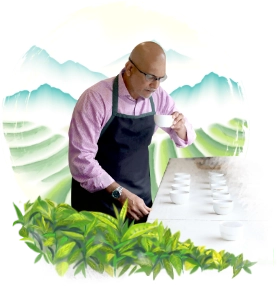How Tea Replaced Coffee in the United Kingdom
Today, tea is the United Kingdom’s national drink. It has deep historical and cultural significance in the UK and is an integral part of British identity. It has been a popular beverage in the UK for centuries, and the British are renowned for their love of tea.
But come to think of it, it was actually coffee that was introduced to the British first, a century and a half before the first consignments of tea arrived. Then, how is it that in spite of having an ‘early mover advantage’, coffee was replaced by tea as the nation’s beverage of choice?
The rise and fall of coffee and its eventual replacement by tea in the United Kingdom is a fascinating story. Like the modern-day cola-wars, there were phases when coffee was more popular than tea, and at times tea surpassed coffee in dominance.
The Popularity of Coffee
Coffee was first introduced to the United Kingdom in the mid-16th century. It was brought to England by traders and travellers who had encountered the beverage during their journeys. The earliest recorded evidence of coffee in the UK dates back to the mid-16th century when a Greek servant named Pasqua Rosee opened the first coffeehouse in Oxford. However, coffee remained a relatively niche product during this time, primarily enjoyed by the intellectual elite.
The popularity of coffee grew during the 18th and 19th centuries, as trade connections expanded and coffee became more accessible. The British East India Company, primarily involved in the tea trade, also traded coffee, further facilitating its availability. Coffeehouses proliferated in cities across the UK, and coffee consumption became a part of daily life.
- The Coffeehouse Culture: The first coffeehouse was opened as early as 1650 at Oxford. Coffeehouses emerged as social and intellectual hubs in the 17th and 18th centuries, fostering a vibrant coffeehouse culture. Coffeehouses provided spaces for intellectual discussions, debates, and networking, attracting writers, artists, politicians, and thinkers. This intellectual allure of coffeehouses, combined with the enticing aroma and stimulating effects of coffee, attracted many patrons away from traditional tea-drinking establishments.
- The Influence of the Coffee Trade: The expansion of colonial trade networks during the 17th and 18th centuries brought coffee to the forefront. The British East India Company, primarily involved in the tea trade, faced competition from Dutch traders who had established coffee plantations in their colonies. The availability of coffee beans from various parts of the world, including Africa, Asia, and the Americas, contributed to its increasing accessibility and affordability.
- Coffee’s Medicinal and Digestive Properties: Coffee was often praised for its perceived health benefits, including its perceived ability to aid digestion. These properties, along with its energizing effects, made coffee a popular choice for breakfast and throughout the day. Additionally, coffee’s reputation for keeping individuals alert and focused attracted those seeking a more stimulating beverage compared to tea’s relatively milder effects.
The Shift to Tea
The shift from coffee to tea as the preferred beverage in the UK is complex and captivating. From its origins in ancient China to its eventual global dominance, tea’s rise to prominence and subsequent displacement of coffee involved a confluence of historical, social, economic, and cultural factors.
Here is what made tea replace coffee
- Tea’s Introduction to the West: The Western world’s first encounter with tea can be traced back to the 16th century when European explorers and traders began establishing connections with the East. Portuguese and Dutch traders were among the first to bring tea back to Europe. Initially, tea was an expensive and exotic commodity, primarily accessible to the aristocracy and the elite.
- Influence of Royal Court: Tea’s popularity in the UK was significantly influenced by the royal court. Queen Catherine of Braganza, the Portuguese wife of King Charles II, had a deep appreciation for tea and introduced it to the British court. Her preference for tea helped popularize the beverage among the elite and aristocracy.
- The Role of the British East India Company : During the 17th century, the popularity of tea grew steadily in Europe. The British East India Company played a pivotal role in introducing tea to England. The introduction of tea rooms and coffeehouses further contributed to tea’s rising popularity, as these establishments became social gathering places for the upper classes.
- The Impact of British Colonialism: The expansion of the British Empire during the 18th and 19th centuries had a profound influence on tea’s rise to prominence. The British established tea plantations in India, Ceylon (now Sri Lanka), and other colonies, ensuring a steady supply of tea for the British market. The British East India Company’s monopoly over the tea trade further facilitated the widespread availability and affordability of tea in the Western world.
- Industrialization and the Rise of Tea Consumption: The Industrial Revolution ransformed societies, including their consumption patterns. With the advent of industrialization, tea became more accessible and affordable to the working class. The mass production and distribution of tea led to its integration into everyday life, with tea breaks becoming a regular feature in the working day.
- The Temperance Movement: The 19th century witnessed the rise of the temperance movement, which advocated for abstinence from alcoholic beverages. Tea emerged as a popular alternative to alcohol, as it provided a mild stimulant and a warm, comforting beverage. The temperance movement’s influence contributed to tea’s growing popularity, particularly among working-class communities.
- Marketing and Advertising: The 19th century witnessed the emergence of modern marketing techniques, including targeted advertising campaigns. Tea companies employed various strategies to promote tea consumption, emphasizing its health benefits, energizing properties, and social status associations. Advertising and branding efforts helped shape tea’s image as a desirable and fashionable beverage.
- Cultural Influences: Tea’s adoption in the Western world was also influenced by cultural factors. The ritual of afternoon tea, popularized by Anna, the Duchess of Bedford, in the mid-19th century, became a symbol of refinement and social status. British colonialism spread tea-drinking customs to other regions, including North America and Australia, further solidifying tea’s cultural significance.
The Decline of Coffee
As tea gained popularity, coffee’s decline in the Western world, particularly the UK, can be attributed to a combination of factors. Changing trade patterns, disruptions in coffee supplies due to conflicts and political unrest, and the rise of tea as a fashionable and fashionable beverage all contributed to coffee’s diminished status.
Another key factor was the role of the two World Wars. The two World Wars had a significant impact on tea’s consolidation as the beverage of choice. During World War I and World War II, the British government rationed coffee, prioritizing tea as the preferred hot beverage for soldiers and civilians. The wartime emphasis on tea consumption reinforced its position as an essential part of British identity and daily life.
Over time, these factors led to tea replacing coffee as the beverage of choice in the UK. The availability, accessibility, changing tastes, cultural practices, and marketing efforts all contributed to tea’s ascendance.
The Re-emergence of Coffee
Coffee staged a smart comeback in the 1980 riding the unprecedented success of Starbucks that almost single handedly created a revolution in the cafe space. Starbucks made coffee drinking classy and fashionable, creating the ‘third place” where people can enjoy authentically brewed coffee in a friendly atmosphere. In many ways, it was the contemporary version of the original coffeehouses that had first made coffee a social beverage in the 17th and 18th centuries. The success of Starbucks in the USA led to mushrooming of coffee cafes all over the world.
The Re-emergence of Tea
Much like how Starbucks redefined the coffeehouses, tea has also made a smart comeback in recent years as a health and wellness beverage drink. Pure tea (without milk or sugar), has much less caffeine than coffee with an amazing array of minerals and vitamins. It is free of any preservatives, colorings or any added flavours. What triggered the emergence of tea is Specialty tea : tea blended with various herbs, spices, fruits, flowers and berries, resulting in a myriad range of choices for the new age consumers, who want to try new variations. Today, we have Oolong tea with orange rind, Green tea with Holy Basil, Masala Chai (Black tea with spices) and White tea with rose petals. The possibilities are endless! This new avatar from pure tea to specialty tea has attracted so many new-age consumers, especially the -willing-to-try GenZ and millennials.
Both coffee and tea have had interesting journeys in the UK (as also all over the world). But in the UK, tea continues to have a special place in the heart of the Britons. From their timeless English Breakfast to their elegant Earl Grey, from their stylish Afternoon Tea to their staple Builders Tea – tea continues to be the UK’s favourite beverage!

Tea is a religion in the art of life.

